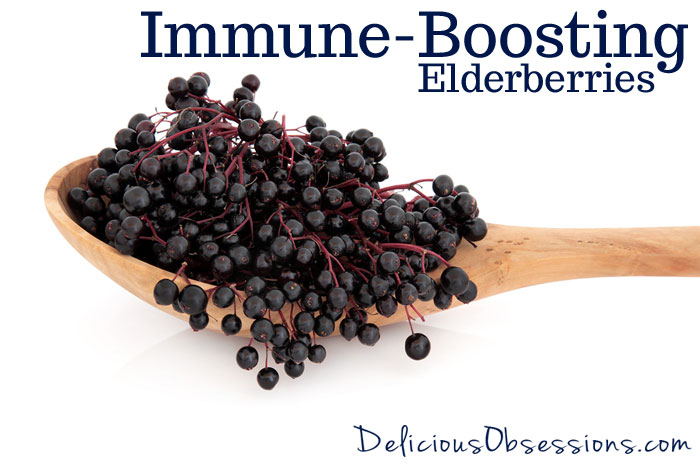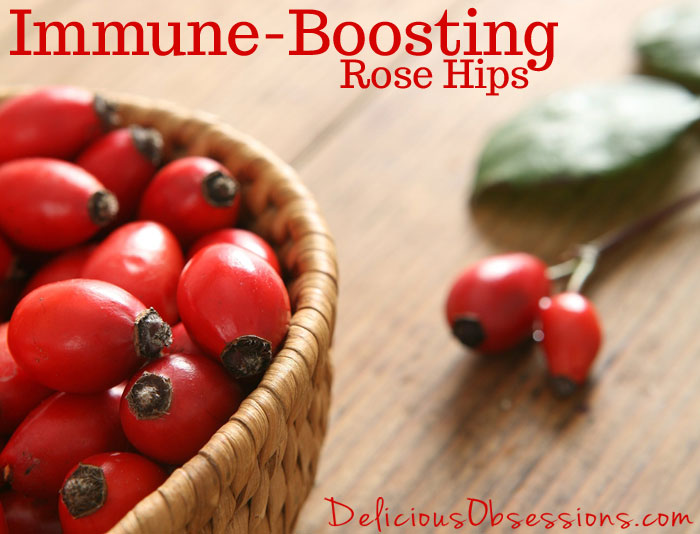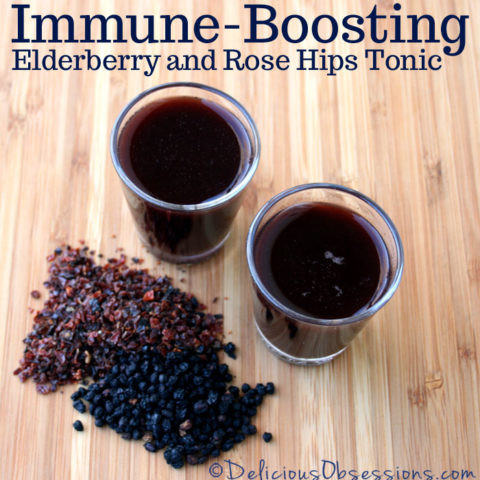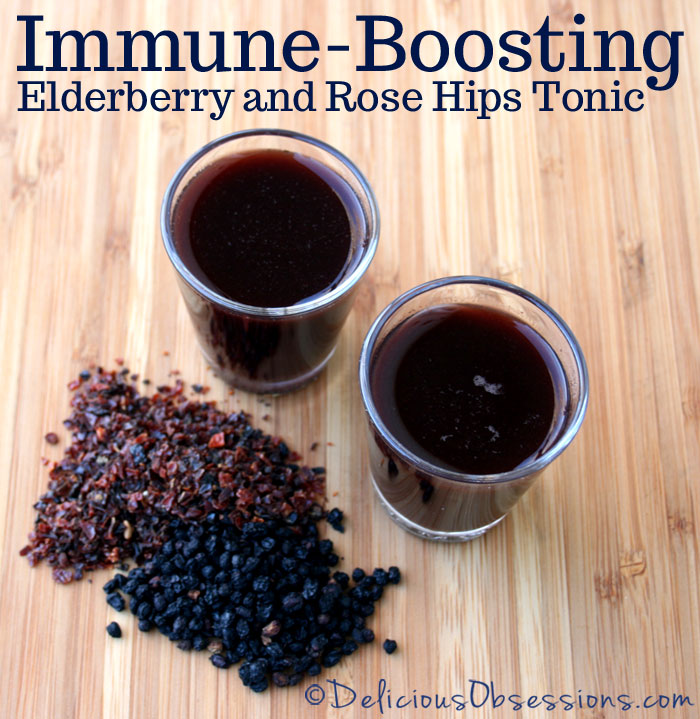FTC Disclosure: Delicious Obsessions may receive comissions from purchases made through links in this article. As an Amazon Associate I earn from qualifying purchases.Read our full terms and conditions here.
I have long used elderberries and rose hips for boosting immune health. I used to buy elderberry syrup every fall to keep on hand during cold and flu season and rose hips were always part of my vitamin C supplementation regimen. As I started learning more about herbs, I realized that there was a cheaper, and probably more effective, way to incorporate these two immune-boosting herbs into my daily life, all season long.
First, let’s discuss a little about what makes elderberries and rose hips so awesome.
Elderberries (Sambucus) have long been used as a food and an herbal supplement in both America and Europe, as well as in Traditional Chinese Medicine. Both the flowers and the berries can be used. They can be used for jams, jellies, syrups, pies, liqueurs, wines, and more. There are a number of plants in this genus, and most of them are poisonous. Sambucus nigra is the only variety to be considered non-toxic and only the flowers and berries are used. The branches and leaves are poisonous.
Elderberries contain a set of complex sugars that are immune-boosting. They are also a great source of vitamin C and contain more phosphorus and potassium than other temperate fruits. Due to their dark color, they are a rich source of antioxidants and bioflavonoids. In addition, they contain some vitamin A and B, as well as amino acids and carotenoids. “Flavonoids, including quercetin, are believed to account for the therapeutic actions of the elderberry flowers and berries.” (source)

Rose hips (Rosa canina) are the fruits of the rose plant and have a tart flavor. They are typically a reddish-orange color, but can also range from dark purple to black in some plant varieties. They develop in the fall when the rose petals have fallen off the plant. Like elderberries, rosehips have long been used as a food and herbal medicine. They are used for everything from jams and jellies to soups to teas to wine and more. They can also be eaten raw. Rosehips grow wild where my parents live and I grew up picking them off the bush and eating them raw.
Rose hips are super high in vitamin C (even more so than citrus fruits), which is why they are great for boosting the immune system. They are also a good source of lycopene, which is an important antioxidant. They do contain vitamins A, B, D, and E in varying amounts, as well as flavonoids and some essential fatty acids. Vitamin C is better assimilated in the body when paired with flavonoids, so that is why you will often see the two packaged together in supplements. Rose hips are nature’s perfect little immune boosting package. During World War II, rose hips were gathered to make rose hip syrup for soldiers since citrus fruit was impossible to get and vitamin C is critical for wellness.

Now that we know why these two berries are so great for our bodies, let’s make a quick tonic that we can sip on throughout the year and give our bodies a little extra nutritional love.
I make this by the quart and we drink about a quarter cup of it each day. Since they’re berries, you will use the decoction method to make this tonic.
Don’t know what a decoction is?
Check out this post on How to Make Basic Herbal Preparations: Infusions, Decoctions, and Tinctures. If you want to learn more about where I source my herbs, check out my Real Food Resources page.

Immune-Boosting Elderberry and Rose Hips Tonic
I have linked to the products from my affiliate partners that I personally use and recommend. If you purchase through one of these links, I may earn a small commission.
Ingredients
- 1/4 cup organic dried elderberries
- 1/4 cup organic dried rose hips
- 1 quart filtered water
Instructions
- Bring 1 quart of filtered water to a boil in a saucepan.
- Add your dried elderberries and rose hips, reduce heat to low, and cover with a lid.
- Simmer on low for 20-30 minutes and then remove from the heat. You can strain off the tonic now, or you can let it sit covered until it cools. I often let it sit for several hours as I get busy working on other things.
- Once the tonic cools, strain off the berries and store in a glass jar in the fridge for up to a week.
- Try to drink a little each day. You could even mix it with other teas, smoothies, or beverages if you don't like the taste of the tonic on its own.
Further Reading / Watching
If you’re new to herbs and are feeling confused about all the different preparations for them, don’t be! Let me help you out with this Basic Herbal Preparations post. You can also watch the videos below to learn more about a couple of herbal preparations and about my favorite source for organic, sustainably harvested herbs.
References
- “Rose Hip” | Wikipedia
- “Rose Hips” | Mountain Rose Herbs
- “Elder Berries” | Mountain Rose Herbs
- “Sambucus” | Wikipedia
- “Elderberries” | Cornell University
- “Elderberry” | Herb Wisdom


18 Comments